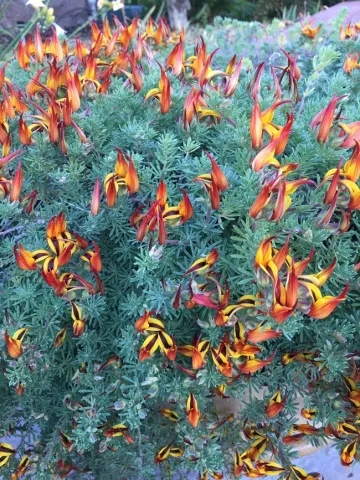
Parrot's Beak
By Leslie Stevens UCCE Master Gardener
Lotus berthelotii
lanting areas: Sunset Zones 9, 15-24, H1
Size: 8-12 inches high with 2-to-3-foot long trailing stems
Bloom season: Spring through summer
Exposure: Full sun to partial shade
Pruning needs: shear to maintain shape, size and bushiness
Water needs: Relatively drought tolerant once established; requires well-drained soil to avoid rot.
Snapshot:
If your garden could use a shot of color and a touch of whimsy, Parrot's Beak could be for you. This tropical perennial derives its common name from its abundance of flamboyant bird-beak shaped flowers in striking shades of yellow, orange and red.
This Canary Islands native thrives in our mild coastal climate zones where it enjoys full sun and nearly frost-free weather. It also prefers cooler nights that promote blooming. In colder winter areas, it can be grown as a summer annual.
Parrot's Beak's long stems covered in fine, silvery-gray leaves make an attractive ground cover. It's also very effective cascading down walls or over boulders. Or better yet, grow this bushy, exuberant bloomer in a large pot where it's sure to become a garden focal point.
This member of the Lotus family is relatively disease free and easy to grow in its proper climate. It will not tolerate water-saturated soils that can lead to root rot. Also monitor plants regularly for aphids, spider mites and mealy bugs. Wash off with strong water spray. If that doesn't work, apply horticultural oil or insecticidal soap.
Now, sit back and admire this handsome prolific bloomer!

